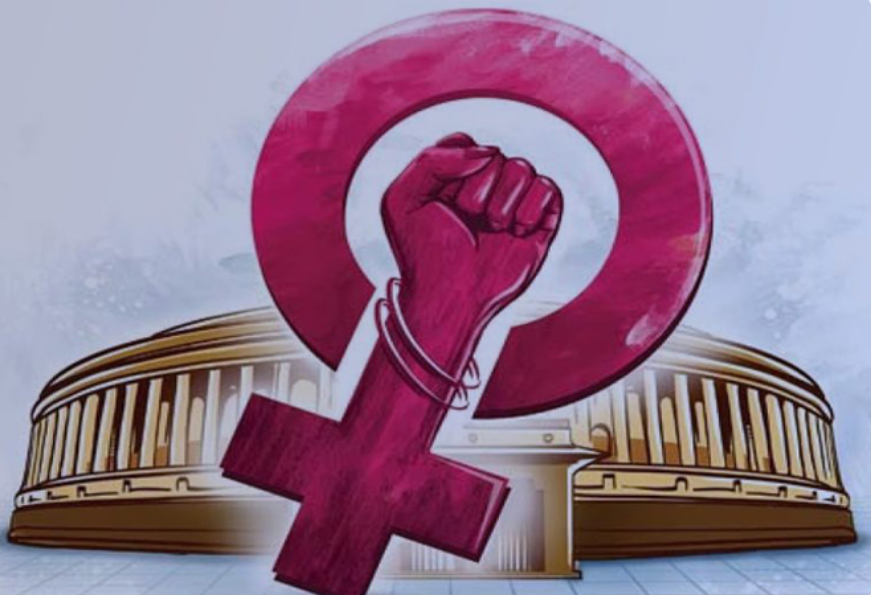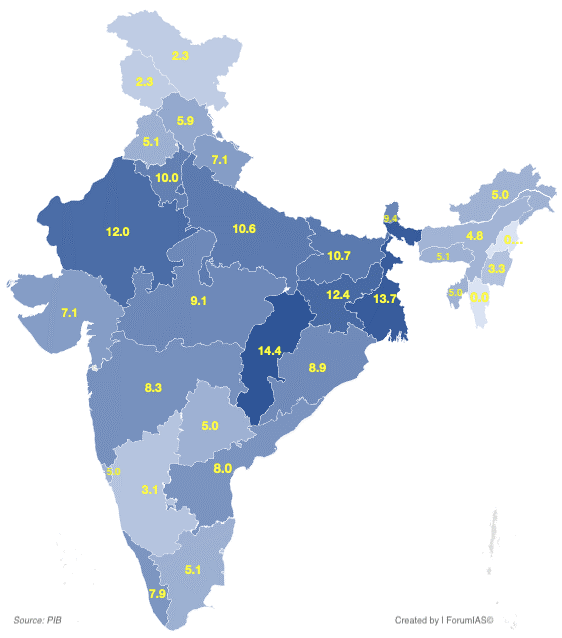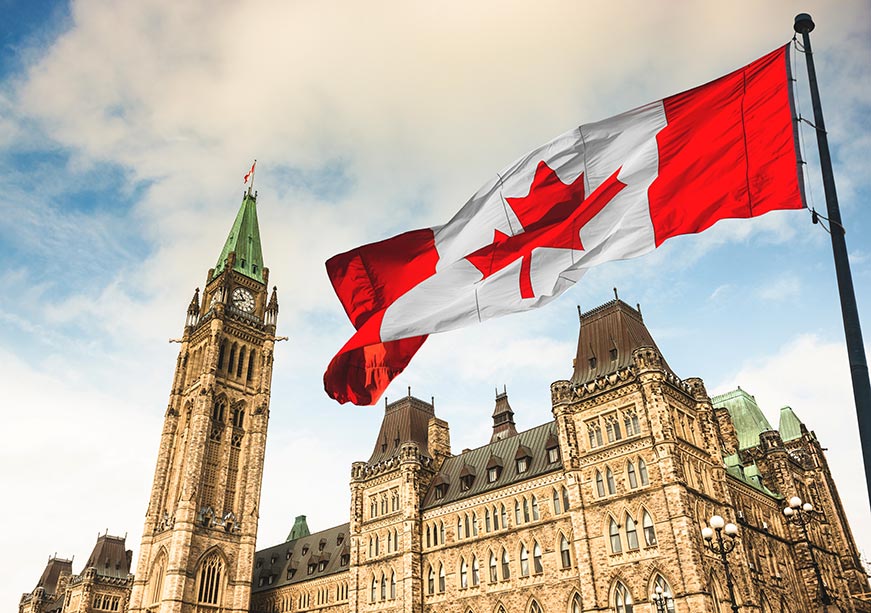
20 September 2023 will be etched into the annals of Indian parliamentary history as a momentous day as the Women's Reservation Bill or the Constitution (108th Amendment) Bill of 2008 finally received the green light from the Cabinet during the ongoing Special Session of Parliament and was subsequently passed by the Lok Sabha. In 2010, the Rajya Sabha passed the bill, garnering a two-thirds majority, with just one dissenting vote amongst the 187 votes cast. However, regrettably, the lower house never had the opportunity to vote on it, and the bill ultimately became defunct with the dissolution of the 15th Lok Sabha.
Figure 1: Percentage of Women Representatives in State Legislative Assemblies (as of December 31, 2021)

Source: Press Information Bureau, Government of India
Note: The proportion for Jammu and Kashmir/Ladakh is based on the last elections held in 2014.[/caption]
The G20 New Delhi Leader's Declaration, which was also launched about a week before the passing of the Women's Reservation Bill, underscores the G20's commitment to gender equality as a foundational principle. It emphasises that investing in empowering all women and girls yields a multiplier effect in advancing the goals outlined in the 2030 Agenda for Sustainable Development, especially Sustainable Development Goal (SDG) 5 on Gender Equality. Under India's leadership during the G20 presidency, the focus has shifted from mere women's development to women-led development. India has already pledged to achieve the targets outlined in SDG 5.5 of the 2030 Agenda, which calls for women's full and effective participation and equal opportunities for their leadership at all levels of decision-making in politics and public life.
Historical context
In 2008, the introduction of the Women's Reservation Bill marked a historic moment in India's legislative history. It was a groundbreaking attempt to address the underrepresentation of women in decision-making bodies, proposing a one-third reservation for women in the national and state legislatures, specifically the Lok Sabha and Vidhan Sabhas. The endorsement of the Women's Reservation Bill had always enjoyed considerable support, with former Prime Minister Atal Bihari Vajpayee once affirming, “the government is unequivocally in favour of introducing women's reservation... If women's empowerment is our objective, then their representation must be increased.” This bill, also known as the Constitution Bill (108th Amendment), garnered significant attention and support. Prime Minister Manmohan Singh and Leader of the Opposition Arun Jaitley hailed it as “momentous and historic.” However, despite its initial success in the Rajya Sabha, the bill ultimately lapsed with the dissolution of the 15th Lok Sabha, highlighting the challenges of implementing such reservations at the legislative level.
The endorsement of the Women's Reservation Bill had always enjoyed considerable support, with former Prime Minister Atal Bihari Vajpayee once affirming, “the government is unequivocally in favour of introducing women's reservation...
The concept of women's reservation in legislatures was first explored after the Rajiv Gandhi government introduced a constitutional amendment to provide reservations for women in Panchayati Raj Institutions (PRIs). Subsequent governments promised to deliver women's reservations in legislatures but faced challenges garnering sufficient support. In the lead-up to the 17th Lok Sabha elections, both major national parties, the Indian National Congress (INC) and the Bharatiya Janata Party (BJP), included the objective of achieving 33 percent reservations for women in central and state legislatures in their manifestos. However, the question remained whether there is enough political will to transform this commitment into law. While legislative reservations for women have been discussed for over three decades, it's essential to recognise that there may be better solutions for achieving women's political empowerment. The delay in implementing these reservations also reflected the reluctance of male-dominated legislators to address gender disparities in politics.
The lower houses of the legislatures play a crucial role in addressing community-level issues, and reservations are viewed as a means to ensure women's participation in politics, given the barriers such as illiteracy and lack of autonomy that hinder their entry into parliament. A more nuanced approach to political empowerment can be found in the 73rd Amendment to the Indian Constitution, which advocates for reserving seats for minority groups like women, scheduled castes, and scheduled tribes in PRIs. Unlike parliamentary and state assembly representation, PRIs focus on the equitable distribution of public goods at the grassroots level, prioritising the interests of rural women. This approach also had the potential to translate gender parity policies into localised actions that uphold the principles of gender equity.
Social structures and representation
However, the effectiveness of gender parity policies at the grassroots level is heavily influenced by existing social structures, including caste, gender, and religion. These structures create hierarchical social relations that persist throughout an individual's life and significantly impact social interactions and status representation. The Subjective Group Dynamics (SGD) theory highlights that group members are motivated to maintain a positive societal identity, which is reflected in the functioning of political parties. These parties often align with traditional hierarchical social structures to avoid alienating voters. Similarly, the state apparatus has shown limited enthusiasm for promoting effective electoral representation of women, as it may clash with established interests. Additionally, legislative reservations for women would also perpetuate the bibi–beti–bahu culture, wherein women are regarded primarily as wives, daughters, and daughters-in-law, rather than as autonomous individuals. These dynamics underscore the challenges posed by existing patriarchal structures to achieving true gender equality in politics.
Employing conventional statistical significance tests, they made a compelling case that female leaders are more likely to allocate resources towards public goods relevant to the local female population.
Despite these challenges, the representation of women in political positions can have a lasting impact. Studies have shown that the repeated election of female candidates can reduce gender gaps in societal aspirations. Female sarpanches in Indian villages have also been found to increase the likelihood of electing female village heads. In 2004, prominent economists Raghabendra Chattopadhyay and Esther Duflo used datasets from Birbhum in West Bengal and Udaipur in Rajasthan to demonstrate the significance of women's representation in panchayats. Employing conventional statistical significance tests, they made a compelling case that female leaders are more likely to allocate resources towards public goods relevant to the local female population. Thus, while political representation may initially appear symbolic, it does have long-lasting effects on voter behaviour and perceptions, particularly at the grassroots level.
In conclusion, while the journey towards women's political empowerment in India faces hurdles, it is worth pursuing. The recent development in terms of the success of the Women's Reservation Bill and ongoing commitment to gender equality underscores the importance of continued efforts to ensure women's full and effective participation at all levels of decision-making in politics and public life. Ultimately, these efforts will leave a lasting impact on society, particularly at the grassroots level, where change is most profound.
For a more detailed analysis, please see the Special Article titled “Equality versus Empowerment: Women in Indian Legislature” published on May 13, 2023, by the same author, in Economic and Political Weekly, Volume 58, Issue No.19.)
Soumya Bhowmick is an Associate Fellow with the Centre for New Economic Diplomacy at Observer Research Foundation
The views expressed above belong to the author(s). ORF research and analyses now available on Telegram! Click here to access our curated content — blogs, longforms and interviews.





 PREV
PREV


